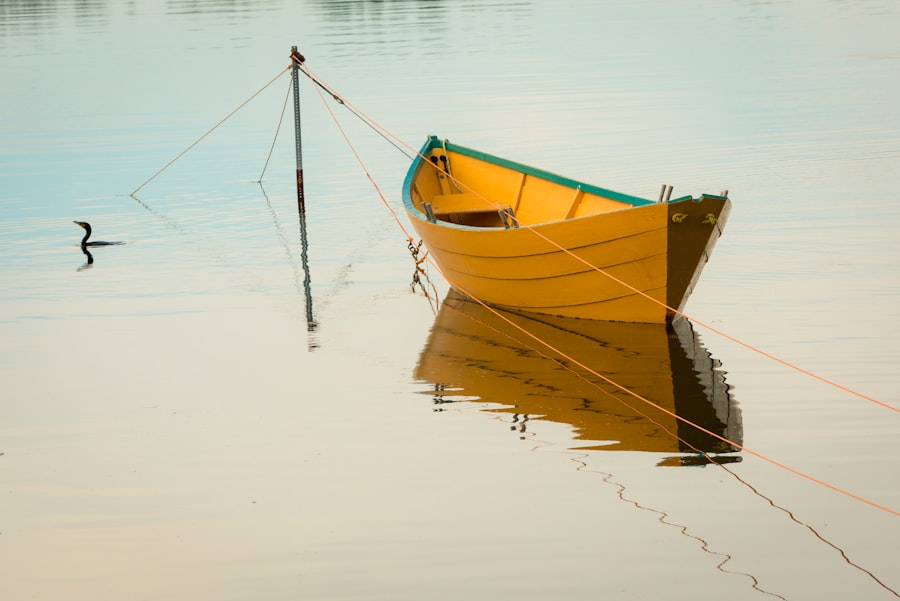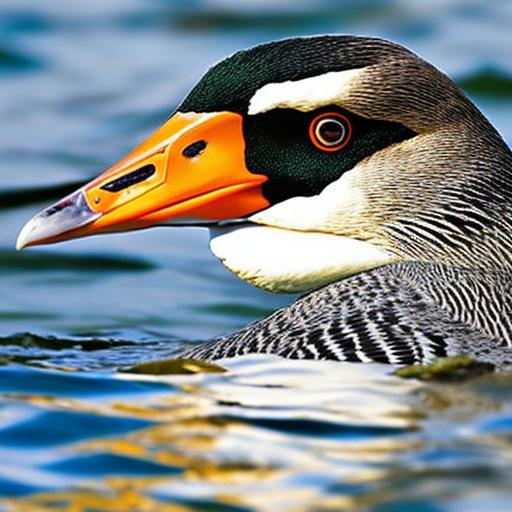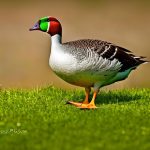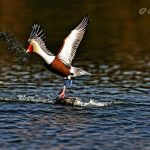Geese on boats may seem like a harmless and even amusing sight, but it can actually be a significant problem for boat owners. Geese are attracted to boats for various reasons, including the availability of food and shelter. However, their presence can lead to damage and other issues that can be costly and time-consuming to address.
One of the main problems with geese on boats is the damage they can cause. Geese have sharp beaks and claws that can scratch and peck at the surface of the boat, causing unsightly marks and potentially even punctures. They may also leave behind droppings, which not only create a mess but can also be corrosive to certain materials used in boat construction. Additionally, geese may build nests on boats, which can further contribute to damage and make it difficult for boat owners to use their vessels.
Key Takeaways
- Geese can cause significant damage to boats, including scratches, dents, and corrosion.
- Understanding geese behavior and habits can help in finding natural ways to deter them from boats.
- Physical barriers, such as netting and spikes, can be effective in keeping geese off boats.
- Decoys, sound and light deterrents, and chemical repellents are other options to consider.
- Regular maintenance and cleaning of boats can help prevent geese from being attracted to them.
The damage geese can cause to boats
Geese can cause a range of damage to boats, both externally and internally. Externally, their sharp beaks and claws can scratch and peck at the surface of the boat, leaving behind visible marks that can be difficult to remove. In some cases, they may even puncture the surface of the boat, leading to more serious damage that requires professional repair.
Internally, geese can cause damage by building nests on boats. These nests can block drains and vents, leading to water accumulation and potential flooding. They may also chew on wires and cables, causing electrical issues that can be dangerous and costly to fix.
Real-life situations where geese have caused damage are not uncommon. Boat owners have reported finding scratches and peck marks on their boats after geese have been present. In some cases, geese have even caused punctures in the hull of the boat, requiring extensive repairs. Additionally, nests built by geese have been known to cause water damage and electrical issues, leading to costly repairs and inconvenience for boat owners.
Understanding geese behavior and habits
To effectively address the problem of geese on boats, it is important to understand their behavior and habits. Geese are social animals that typically live in flocks and are attracted to areas with open water and ample food sources. They are also drawn to areas that provide shelter and protection from predators.
Boats can be particularly attractive to geese because they offer all of these elements. The open water surrounding boats provides a source of food, such as algae and aquatic plants. The structure of the boat itself can provide shelter from predators, as well as a safe place to build nests.
Geese are also known to be territorial animals, especially during breeding season. They may view boats as potential nesting sites and become aggressive towards anyone who approaches. This territorial behavior can further contribute to damage and make it difficult for boat owners to use their vessels.
Natural ways to deter geese from boats
There are several natural methods that can be used to deter geese from boats. One effective method is to remove any potential food sources from the area surrounding the boat. This can include removing algae and aquatic plants from the water, as well as securing any food or garbage that may attract geese.
Another natural deterrent is the use of landscaping techniques that make the area less attractive to geese. For example, planting tall grasses or shrubs around the perimeter of the boat can create a physical barrier that makes it more difficult for geese to access the boat. Additionally, using plants that geese find unappealing, such as prickly bushes or plants with strong odors, can help deter them from approaching.
Finally, introducing natural predators can also be an effective way to deter geese from boats. For example, placing decoy predators such as plastic owls or coyotes near the boat can create the illusion of a threat and discourage geese from approaching.
Physical barriers to keep geese off boats
In addition to natural methods, there are also physical barriers that can be used to keep geese off boats. One option is to install netting or wire mesh around the perimeter of the boat. This creates a physical barrier that prevents geese from accessing the boat and building nests.
Another option is to use spikes or strips that can be attached to the surface of the boat. These spikes or strips make it uncomfortable for geese to land on the boat, discouraging them from staying or causing damage.
Additionally, inflatable scarecrows or motion-activated sprinklers can be effective physical deterrents. These devices create movement and noise that startle geese and make them uncomfortable, encouraging them to leave the area.
Using decoys to trick geese away from boats

Decoys can be an effective tool for tricking geese away from boats. One popular decoy is the floating alligator head, which resembles a predator and can be placed in the water near the boat. The presence of the decoy can deter geese from approaching, as they perceive it as a threat.
Another effective decoy is the plastic owl, which can be placed on top of the boat or on nearby structures. The owl’s presence can create the illusion of a predator and discourage geese from approaching.
It is important to regularly move and reposition decoys to maintain their effectiveness. Geese are intelligent animals and can quickly learn that a decoy is not a real threat if it remains in the same position for an extended period of time.
Sound and light deterrents for geese
Sound and light deterrents can also be effective in keeping geese away from boats. One option is to use devices that emit loud noises or distress calls that mimic those of geese in distress. These sounds can startle geese and make them uncomfortable, encouraging them to leave the area.
Another option is to use devices that emit bright lights or strobe lights. Geese are sensitive to light and may be deterred by the sudden change in brightness. Additionally, the movement of the lights can create the illusion of a threat and discourage geese from approaching.
It is important to note that sound and light deterrents should be used sparingly and in accordance with local regulations. Excessive or prolonged use of these devices can be disruptive to both humans and wildlife.
Chemical repellents for geese on boats
Chemical repellents can be used to keep geese off boats, but it is important to use them safely and effectively. One option is to use non-toxic repellents that create an unpleasant taste or smell for geese. These repellents can be applied to the surface of the boat or placed in areas where geese are likely to land or build nests.
Another option is to use visual repellents that create a reflective or shiny surface. Geese are wary of reflective surfaces and may be deterred from approaching if they see their own reflection.
It is important to follow the instructions provided by the manufacturer when using chemical repellents. Some repellents may need to be reapplied regularly, especially after rain or heavy wind.
Tips for maintaining a goose-free boat
Once geese have been successfully deterred from a boat, it is important to take steps to maintain a goose-free environment. Regularly inspecting the boat for signs of geese, such as droppings or nests, can help identify any potential issues before they become a problem.
Keeping the area surrounding the boat clean and free of potential food sources can also help prevent geese from returning. This includes removing any algae or aquatic plants from the water, as well as securing any food or garbage that may attract geese.
Regularly moving and repositioning decoys, as well as maintaining any physical barriers or deterrent devices, can also help ensure their effectiveness over time.
Conclusion and final thoughts on keeping geese off boats
In conclusion, geese on boats can be a significant problem for boat owners. They can cause damage to the boat’s surface, build nests that lead to further damage and inconvenience, and create unsightly messes with their droppings. Understanding geese behavior and habits is key to effectively addressing the problem.
There are various natural and physical deterrents that can be used to keep geese off boats. These include removing potential food sources, using landscaping techniques to make the area less attractive to geese, and installing physical barriers or deterrent devices. Decoys, sound and light deterrents, and chemical repellents can also be effective tools in deterring geese.
Maintaining a goose-free boat requires regular inspection and maintenance, as well as keeping the surrounding area clean and free of potential food sources. By implementing these strategies, boat owners can protect their vessels from damage and enjoy a goose-free boating experience.
If you’re looking for effective ways to keep geese off your boat, you might also be interested in learning about the importance of chicken coop door size. Poultry Wizard has an informative article that discusses how the size of the chicken coop door can impact the safety and comfort of your chickens. Understanding this aspect can help you create a secure environment for your poultry and prevent unwanted visitors like geese from entering. Check out the article here to learn more about this crucial aspect of chicken coop design.
FAQs
What are the common problems caused by geese on boats?
Geese can cause damage to boats by scratching and pecking at the surface, leaving droppings that can be difficult to clean, and creating noise and disturbance that can be disruptive to passengers.
What are some effective ways to keep geese off boats?
Some effective ways to keep geese off boats include using decoys, installing bird netting or wire mesh, using bird repellent sprays, and creating physical barriers such as fences or spikes.
Are there any humane methods to keep geese off boats?
Yes, there are humane methods to keep geese off boats such as using motion-activated sprinklers, using reflective tape or balloons, and planting vegetation that geese do not like.
Why is it important to keep geese off boats?
It is important to keep geese off boats to prevent damage to the boat, maintain a clean and hygienic environment, and ensure the safety and comfort of passengers.
What are some long-term solutions to keep geese off boats?
Some long-term solutions to keep geese off boats include modifying the boat design to make it less attractive to geese, using sound or light deterrents, and implementing habitat management strategies to discourage geese from nesting in the area.
Meet Walter, the feathered-friend fanatic of Florida! Nestled in the sunshine state, Walter struts through life with his feathered companions, clucking his way to happiness. With a coop that’s fancier than a five-star hotel, he’s the Don Juan of the chicken world. When he’s not teaching his hens to do the cha-cha, you’ll find him in a heated debate with his prized rooster, Sir Clucks-a-Lot. Walter’s poultry passion is no yolk; he’s the sunny-side-up guy you never knew you needed in your flock of friends!







